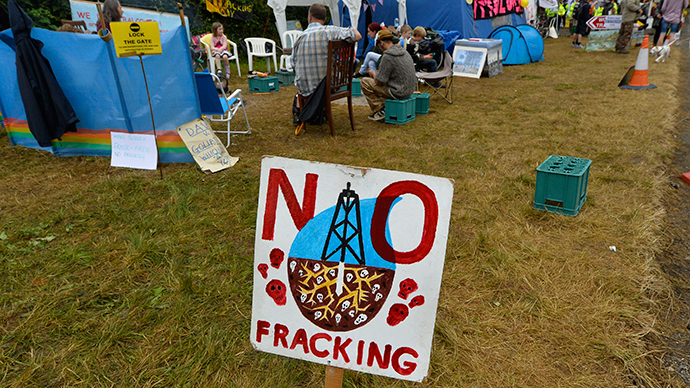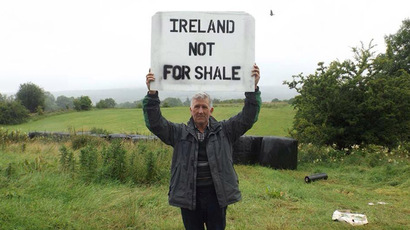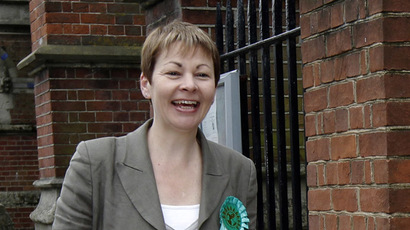Frack & ruin: UK farmers fear financial devastation from shale drilling

British farmers fear extreme financial difficulty as a result of government plans to push through shale gas drilling on their land without the promise of compensation, the UK’s National Farmers’ Union warns.
UK ministers in favor of fracking must not assume the backing of rural communities, the union cautions, stressing that such a move could stoke the ire of farmers concerned about a depreciation in the value of their land.
A failure to show consideration for farmers’ concerns may risk turning them against shale gas drilling in their locales altogether, the NFU told the Telegraph on Monday.
Nevertheless, the government is pursuing a legislative shift, which will strip UK citizens of the right to obstruct plans to frack beneath their land. The coalition has confirmed compensation will not be issued to UK homeowners or landowners forced to tolerate fracking on their acerage – insisting gas and oil extraction will not spark a reduction in the value of land on which such processes occur.
But the NFU, which represents the interests of 55,000 members and 47,000 agricultural and farming businesses throughout Wales and England, says many of its members are acutely concerned that fracking could reduce the value of their land even in the absence of ecological or environmental damage.

Farmers argue such reductions in land value could arise as a result of prevailing views relating to the controversial energy extraction technique.
The NFU warns shale gas drilling and exploration could reap destructive consequences for farmers, particularly for those whose mortgages are firmly fixed to their acerage.
Farmers are also fearful that supermarkets may stop sourcing and buying agricultural produce grown on drilling sites, Dr. Jonathan Scurlock, the NFU’s renewable energy and climate change chief, told the Telegraph.
As a result, the union is currently pursuing government assurances that British landowners will be afforded protection against the economic impacts of fracking.
While farmers had initially viewed shale gas drilling as a potential opportunity to generate revenue, this optimism has been overshadowed by widespread concerns the farming sector's interests are not a government priority, Scurlock warned.
“Some of that is a consequence of the appearance that government and industry are trying to brush rural economy concerns under the carpet,” he said.
The NFU’s move to protect the interests of UK farmers follows the British government’s recent decision to censor an official state report on the impact of fracking on UK property prices and regional services.
Following a Freedom of Information (FOI) request tendered to the government, the redacted report was published with extensive sections of the text missing. One particular section of the report, which examines the impact of fracking on house prices, had three entire segments missing.
The controversial report was released by the Department for Environment, Food and Rural Affairs (DEFRA) in the aftermath of the government’s decision to open up two-thirds of England’s landmass to a fresh round of bidding for fracking licenses.

A DEFRA letter, which accompanied the document, defended the government’s decision to withhold elements of its findings. Emphasizing that piecemeal transparency with respect to the research was in the “public interest,” DEFRA claimed state officials had to carefully “consider implications of potential impacts” relating to the “development of the shale gas industry.”
The withholding of such information would allow for the developing of fracking options in the UK, and mitigate “the risk that disclosure of early thinking could close down discussion” on shale gas drilling, DEFRA argued.
Commenting on the redacted DEFRA report, Scurlock told the Telegraph the government’s decision to censor the document had been a “public relations disaster.”
“I don’t think anyone can take support of agriculture and the rural economy for granted,” he said.
Under current parliamentary proposals, the only compensation offered to regional community groups facing the prospect of fracking in their locales would be issued on a voluntary basis. But Scurlock warned such a measure was unsatisfactory, arguing individual landowners should be paid compensation.
Prime Minister David Cameron and Chancellor of the Exchequer George Osborne say shale gas extraction harbors the potential to enrich the UK’s economy and decrease energy bills. But in recent times many MPs and campaigners across the nation have contested this view, expressing deep concern that fracking will cause environmental damage, disfigure the landscape, and decrease the value of UK home prices.














